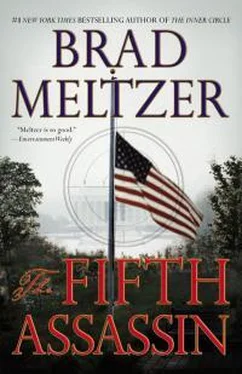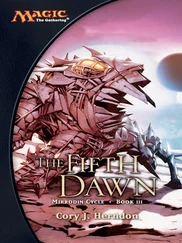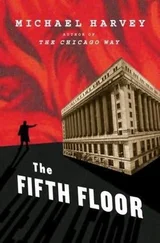“I know. I saw you,” Pastor Riis said. “They weren’t mine. We confiscate them every few months and just toss them down there. Cricket’s always worried about people seeing them in the church trash.”
“You’re not listening,” Marshall insisted, his voice starting to speed. “When I came back last week… to your basement… it was because I thought you snuck into my room—”
“Marshall, I’d never—”
“I know. I know that now,” Marshall stuttered, feeling the tears swelling behind his eyes, but refusing to let them out. “I found them a few days ago in my dad’s closet… when I was helping him clean up. He’s the one who took them from my room. But if I didn’t go back to your house… back into your basement… If I didn’t see my mom and Mrs. Riis—” Fighting the tears, he started to gasp, struggling to catch his breath as a week’s worth of horrors cracked the dam in his chest, flooding forward. “ Oh, God, don’t you see what I’ve done!? I killed my mom! ”
“Marshall, this is not your fault. Your mother killed herself. You’re not responsible.”
“No, that’s not true! This is God’s punishment. This is for what I did…! I’m so sorry…! ” he said, sobbing and sinking downward.
Pastor Riis knelt by the beanbag, taking Marshall in his arms. “That’s not how God works, Marshall. Are you hearing me? God doesn’t work like that,” Riis said as Marshall crumpled against his chest.
For several minutes, Marshall sobbed, sniffling over and over. Finally, the storm subsided. He was exhausted.
“I will say, though, I think you ruined my sweater,” Pastor Riis joked, pointing to the gob of snot that was now on his chest.
Even Marshall had to laugh, pulling away, lifting his glasses, and wiping his eyes with the heel of his hand. “I’m—I’m just so sorry I caused so much pain for you.”
“You owe me no apologies,” the pastor said. “The experienced life is far more fulfilling than the blissful and innocent life. Y’know who said that?”
“Jesus.”
“No, not Jesus. William Blake. He’s pretty good too.”
Marshall smiled at that. “Still doesn’t change the fact that my mom’s gone. I ruined my life.”
Taking a seat back on the milk crate, Pastor Riis gave a sharp tug to the thread at his wrist, snapping it from the sweater. “Marshall, y’ever hear of Harry Houdini?”
“Of course. I did a book report on him last year. World’s greatest magician.”
“And escape artist. Magician and escape artist. And did you know he was from Wisconsin? Not far from here.”
“In Appleton—I know. That was in the report too.”
“Then you know that after his father died, his mother wanted him to take a factory job that would help support the family. Instead, Houdini followed his heart, literally joined the circus, and eventually became the most famous performer of his time. Such a great story, right? But of all his achievements, you know what Houdini’s greatest escape was?”
“The one where he’s in a coffin at the bottom of a pool for an hour and a half?”
“That’s the trick that killed him. Not his finest.”
“What about the water torture one, where he’s tied up and lowered into a fish tank?”
“Nope.”
“I don’t know… The one where he jumps from the bridge… or where they stuff him in a milk jug… They’re all the same.”
“You’re right. They are all the same. But y’know which escape is his best, Marshall? When Houdini left Wisconsin. And moved on with his life.”
Turning toward the pastor, Marshall sniffled hard, sucking everything inside. He stared down, through the Plexiglas window, at the roof of his house. His old house.
“Pastor Riis, can I ask you a dumb question? How far is Toledo from Michigan?”
“Barely an hour. Why?”
“No, no reason. I was just thinking, if you’re ever bored or something, I dunno… Maybe you could come for a visit. Or something.”
Sitting on his milk crate, Pastor Riis leaned his elbows on his knees, and grinned with just his eyes. “I’d like that. And even when I’m not bored, if you ever need anyone to talk to, or want to hear me steal quotes from my old sermons, just let me know and I’ll be there too.”
He meant it.
Over the course of the next decade, Pastor Riis would stay in touch with Marshall, offering advice, visiting Michigan, and (though he never told Marshall) helping out financially when Marshall’s dad got sick and the hospital bills again began to pile up. Even when Marshall’s dad got better, and a teenage Marshall got arrested after that incident in East Lansing, and arrested again in his twenties, Pastor Riis would check in, still write, and still work to keep Marshall out of the trouble that always seemed to find him.
Indeed, it was Riis who would first suggest that Marshall enlist with the military, since Riis was a military man himself. It was a decision that would change Marshall forever.
So, three weeks ago, when Marshall heard about Pastor Riis’s death, and found out that someone had shot him in the chest with an obscure old gun, Marshall swore he would tear the gates of hell off their hinges to find the person responsible.
“Maybe we can plan something for Christmas break. Or even earlier,” Pastor Riis offered, standing from the milk crate and ducking down slightly in the treehouse.
“Sure,” Marshall said, watching Pastor Riis climb down the ladder rungs, not really believing he’d ever see the pastor again.
110
Today
Camp David
My wrists hurt.
So does my back.
I’ve lost track of time. It feels like seven or eight at night, but since the shelter has no windows, it’s hard to know for sure. I’m still hunched on the edge of the bed, my hands still cuffed to the metal footboard.
For the first few hours, they asked questions nonstop: about Marshall, and the Knight, and about what I knew and didn’t know about the foiled attack on the President. I saw most of it onscreen, including Frick and Marshall. When the Service finally left, I knew we weren’t done. But when an hour went by and no one returned, it made no sense. Then a second hour went by. Then a third, making me wonder if they’d forgotten about me. It’s almost nighttime now.
Leaning toward the metal door, I listen, trying to see if anyone’s coming. The problem is, the whole shelter has an odd metallic hum, most likely from whatever generators are down here. Closing my eyes, I focus harder, listening through the noise. Above me, a wisp of warm air blows from the air ducts. Every once in a while, there’s a click-clack of someone walking the hallway. But from the faint rumble of voices coming from the room across the hall, at least half a dozen agents are still gathered together in one place.
Until they’re not.
The rumbling comes quick, pounding out into the hallway, toward the metal stairwell. They’re moving fast, with purpose.
“Viv, stay here,” Agent Reed calls back as the stampede rises upward. Within seconds, the submarine door slams shut, everything goes silent, and I’m still alone, handcuffed to the bed.
I’m tempted to scream for someone to let me out. But in the underground shelter below Camp David, the Secret Service only moves like that for one person.
All this time, I thought they were working me over. What they were really doing was making me wait.
For him.
From above, the submarine door again opens with a loud pop. There’s no stampede this time, just a lonely ting-ting of footsteps clanging against the metal treads. These aren’t the steel-toed boots that most of the agents wear. The sound is softer, like dress shoes.
There’s a long silent pause. I lean toward the door, trying to hear, but my heart is drumrolling too loudly.
Читать дальше











